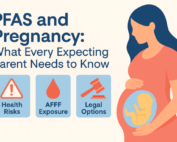Introduction
You might not immediately connect your military service with cancer, but the link is real and alarming. Veterans face unique risks due to exposure to hazardous substances like asbestos, burn pit smoke, and contaminated drinking water. These exposures can lead to various cancers, impacting not just health but quality of life.
Understanding these risks is especially important if you or a loved one has served in the military. Awareness can lead to early detection and better outcomes.
This article lays out the types of cancers most commonly associated with military service, examines the causes, and explores the steps you can take if you’ve been impacted.
Understanding Military Service-Related Cancer
Military service can expose you to various environmental and occupational hazards in ways that others simply don’t get exposed, substantially increasing your cancer risk. These hazards include contact with chemicals, radiation, and other hazardous substances during your service.
Common Environmental Toxins in the Military
Exposure to toxic and hazardous substances in military environments is quite common and increases your cancer risk if you served or are serving in the military. Some unique environmental exposures that servicemembers face are:
- Burn Pits: You might have encountered these during deployments, exposing you to a variety of toxic chemicals through exposure in the air.
- Radiation: Serving in areas where nuclear weapons are stored or tested can expose you to harmful radiation levels.
- Chemical Exposures: Contact with substances like Agent Orange for Korean War and Vietnam War veterans have long been known to increase cancer risk among veterans who served in those conflicts.
- PFAS Chemicals: Military bases linked to cancer often have highly contaminated drinking water supplies containing PFOA and PFOS chemicals. The amount of contamination in military base drinking water systems is often tens of thousands of times greater than the worst contaminated municipal/civilian water system.
(Related Article: Military Bases with Contaminated Water: Health Risks and Ongoing Legal Actions)
Research and Studies on Military Service-Related Cancer
Recent studies continue to demonstrate that military service significantly increases cancer risk due to exposure to high concentrations of toxic substances. This includes higher rates of brain, gastrointestinal, and kidney cancers among veterans.
Key Findings from Recent Research
- Burn Pit Exposure and Cancer Risk: Studies show that exposure to burn pits increases the risk of various cancers. Affected types include brain, gastrointestinal, head or neck, kidney, lymphatic, lymphoma, melanoma, pancreatic, and reproductive cancers. The PACT Act, passed in August 2022, expands the list of presumptive cancers for eligible Gulf War and post-9/11 veterans.
- Military Aviators and Aviation Support Personnel: Research highlights a higher incidence of certain cancers among military aircrew and ground crew. Initial findings indicate elevated cancer rates in these groups, prompting further investigation through Phase 2 studies.
- Data on PFAS Chemicals: Limited information exists regarding the impact of PFOA and PFOS chemicals on cancer rates among military personnel. Further studies are necessary to understand the extent of contamination and its health implications.
- Scope of Affected Populations: Some areas, such as all military bases with PFAS-contaminated water, need more comprehensive research. Determining which bases have the highest contamination levels would aid in assessing long-term cancer risks.
- VA Coverage Assessment: While the VA covers cancer treatment for many conditions, additional analysis is needed to evaluate the effectiveness of their support. This includes assessing how well they address the increasing rates of cancer linked to military exposure.
Research in these areas helps identify and mitigate cancer risks for veterans, ensuring better health outcomes through targeted prevention and treatment strategies.
Prevention and Screening Strategies
Military service-related cancer risks increase due to exposure to environmental and occupational hazards. Implementing effective prevention and screening strategies is crucial for at-risk personnel.
Regular cancer screening ensures early detection and successful treatment. For military personnel, exposure to various hazards makes this especially important. Early detection significantly improves treatment outcomes and reduces mortality rates. Ensure routine screenings through your healthcare provider, particularly if you’re a veteran with known exposure risks.
Avoid Environmental Exposures
- Disclose exposure history to healthcare providers. This ensures targeted screening and care.
- Utilize resources like VA Environmental Health Coordinators and the Environmental Health Registry program. These can help assess exposure risks.
Choose Healthy Lifestyle Choices
- Avoid smoking and tobacco products. Smoking is a primary risk factor for many cancers.
- Engage in regular physical activity. Maintaining an active lifestyle keeps your body healthy and resilient.
- Maintain a healthy diet. A balanced diet supports overall health and reduces cancer risk.
- Limit alcohol consumption. Excessive drinking is linked to higher cancer risk.
- Maintain a healthy weight. Obesity is a known risk factor for various cancers.
Use these strategies to mitigate the increased veteran cancer rates associated with environmental exposures. If you’re concerned about specific hazards like PFAS chemicals or service at military bases linked to cancer, consult your healthcare provider for personalized advice. Regular screenings combined with proactive lifestyle choices significantly enhance cancer prevention and treatment outcomes.
Treatment Options and Support Systems
Military service-related cancer necessitates robust treatment options and support systems. The Veterans Administration (VA) provides extensive resources to address these needs.
Advancements in Cancer Treatment for Veterans
Advancements in cancer treatment for veterans have been significant. The VA offers a range of treatments, including chemotherapy, radiation therapy, surgery, and immunotherapy. Personalized treatment plans cater to the specific type of cancer, exposure history, and individual health conditions. For example, veterans exposed to Agent Orange may receive different therapeutic protocols compared to those exposed to radiation.
Support Resources for Affected Service Members
Support resources for affected service members encompass various VA services. These include medical care covered under VA health benefits, mental health counseling, and community support groups.
Veterans can also access the VA’s Environmental Health Coordinators to discuss exposure concerns and obtain referrals. Online resources provide educational materials and directories of local support groups.
For financial support, disability compensation benefits are available for cancers linked to military service.
The VA remains committed to supporting veterans with cancer, ensuring access to cutting-edge treatments and comprehensive support systems.
Legislation and Policy Impact
The PACT Act, signed on August 10, 2022, has significantly shaped the landscape of cancer treatment for Veterans. This act introduces comprehensive measures to address and mitigate the effects of toxic exposures.
Current Laws Affecting Cancer Treatment for Veterans
The PACT Act extends eligibility for VA health care to Veterans from the Vietnam, Gulf War, and post-9/11 eras with toxic exposures. This expanded eligibility increases access to essential cancer treatment services, ensuring that no veteran is left without necessary care.
Presumptive conditions, a critical component of the PACT Act, streamline the process for Veterans to receive benefits. These conditions include various cancers automatically assumed to be service-connected due to burn pits, making it easier to access treatment. Veterans facing illnesses linked to military service experience expedited benefit approvals, improving their quality of life.
Toxic exposure screening is mandatory for every enrolled Veteran, including initial and follow-up screenings at least every five years. These screenings identify health issues early, facilitating timely intervention and reducing the cancer burden among Veterans.
Advocacy and Future Policy Changes
Ongoing advocacy efforts aim to enhance support for Veterans with cancer. Future policy changes could address gaps in current legislation, ensuring comprehensive coverage for all potential toxic exposures.
Research mandated by the PACT Act on mortality rates, health trends, and cancer rates among Veterans provides valuable data to inform policy decisions. This research may highlight the need for further expansions in presumptive conditions, refining the eligibility criteria.
Advocates push for greater focus on PFAS chemicals, present at military bases, which have contaminated water supplies. Studying the link between these chemicals and cancer rates could lead to new legislative measures addressing this emerging concern.
Future policies may also enhance mental health support and community resources, recognizing the holistic needs of Veterans battling cancer. By continuing to evolve legislative frameworks, society ensures Veterans receive the care they deserve.
Key Takeaways
» Unique Cancer Risks for Veterans: Military service can expose veterans to hazardous substances like burn pit smoke, asbestos, and ingesting toxic PFAS chemicals in base drinking water increasing their risk of developing various cancers.
» Common Cancers Among Veterans: Veterans often face heightened risks for cancers such as testicular cancer, prostate cancer, brain cancer, gastrointestinal cancer, and respiratory cancer due to their exposure to toxic substances during service.
» Importance of Early Detection and Prevention: Awareness and regular screening are crucial for early detection, which can significantly improve outcomes for veterans at risk of military-related cancers.
» VA Resources and Treatment Options: The Veterans Administration (VA) provides comprehensive cancer treatment options and support systems, including chemotherapy, radiation, and counseling services for veterans exposed to hazardous materials.
» Impact of Legislation: Legislation like the PACT Act expands health care coverage and benefits for veterans exposed to toxic substances, making cancer treatment more accessible and efficient.
Conclusion
Addressing military service-related cancer is crucial for ensuring veterans receive the care they deserve. The PACT Act represents a significant step forward by expanding VA health care eligibility and streamlining benefits for those exposed to toxic substances. Continued research and policy updates will be essential in filling existing gaps and providing comprehensive support. As awareness grows and legislative frameworks evolve, the focus remains on delivering holistic care, including mental health resources, to veterans battling cancer. Your advocacy and support can make a difference in driving these necessary changes.






